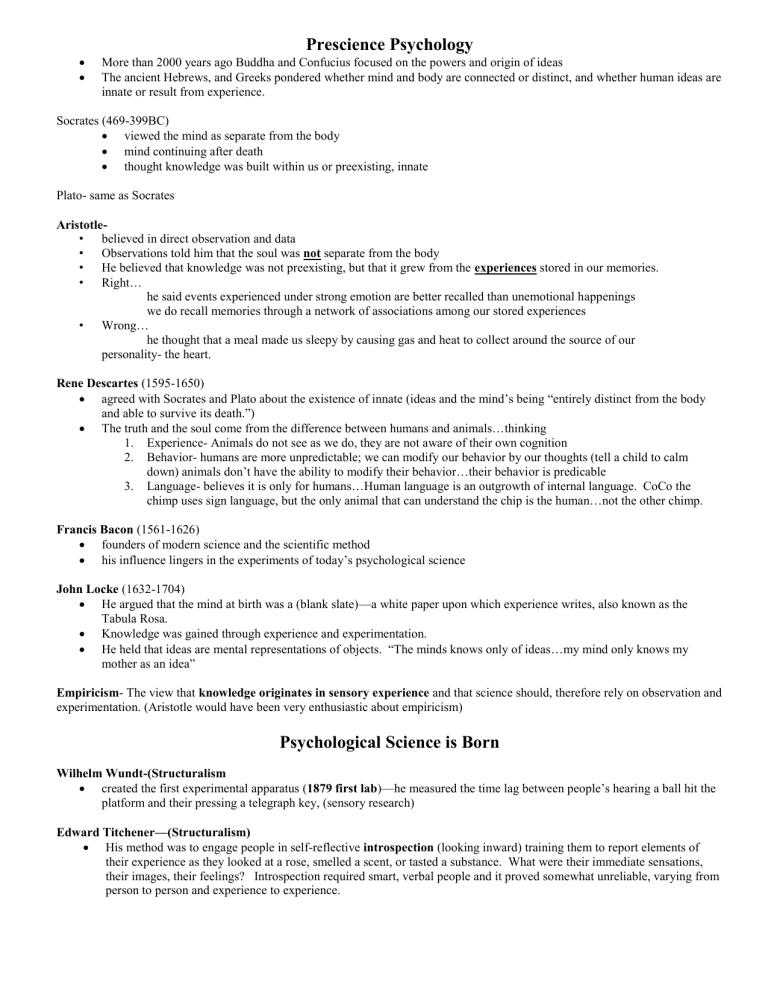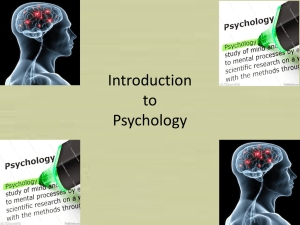History and Approaches Lecture Notes (1)
advertisement

Prescience Psychology More than 2000 years ago Buddha and Confucius focused on the powers and origin of ideas The ancient Hebrews, and Greeks pondered whether mind and body are connected or distinct, and whether human ideas are innate or result from experience. Socrates (469-399BC) viewed the mind as separate from the body mind continuing after death thought knowledge was built within us or preexisting, innate Plato- same as Socrates Aristotle• believed in direct observation and data • Observations told him that the soul was not separate from the body • He believed that knowledge was not preexisting, but that it grew from the experiences stored in our memories. • Right… he said events experienced under strong emotion are better recalled than unemotional happenings we do recall memories through a network of associations among our stored experiences • Wrong… he thought that a meal made us sleepy by causing gas and heat to collect around the source of our personality- the heart. Rene Descartes (1595-1650) agreed with Socrates and Plato about the existence of innate (ideas and the mind’s being “entirely distinct from the body and able to survive its death.”) The truth and the soul come from the difference between humans and animals…thinking 1. Experience- Animals do not see as we do, they are not aware of their own cognition 2. Behavior- humans are more unpredictable; we can modify our behavior by our thoughts (tell a child to calm down) animals don’t have the ability to modify their behavior…their behavior is predicable 3. Language- believes it is only for humans…Human language is an outgrowth of internal language. CoCo the chimp uses sign language, but the only animal that can understand the chip is the human…not the other chimp. Francis Bacon (1561-1626) founders of modern science and the scientific method his influence lingers in the experiments of today’s psychological science John Locke (1632-1704) He argued that the mind at birth was a (blank slate)—a white paper upon which experience writes, also known as the Tabula Rosa. Knowledge was gained through experience and experimentation. He held that ideas are mental representations of objects. “The minds knows only of ideas…my mind only knows my mother as an idea” Empiricism- The view that knowledge originates in sensory experience and that science should, therefore rely on observation and experimentation. (Aristotle would have been very enthusiastic about empiricism) Psychological Science is Born Wilhelm Wundt-(Structuralism created the first experimental apparatus (1879 first lab)—he measured the time lag between people’s hearing a ball hit the platform and their pressing a telegraph key, (sensory research) Edward Titchener—(Structuralism) His method was to engage people in self-reflective introspection (looking inward) training them to report elements of their experience as they looked at a rose, smelled a scent, or tasted a substance. What were their immediate sensations, their images, their feelings? Introspection required smart, verbal people and it proved somewhat unreliable, varying from person to person and experience to experience. William James—(Functionalist) thought to consider the evolved functions of our thoughts and feelings. Smelling is what the nose does; thinking is what the brain does. Under the influence of evolutionary theorist Charles Darwin, James assumed that thinking, like smelling developed because it was adaptive—it contributed to our ancestors’ survival. Consciousness serves a purpose. He wrote Principles of Psychology in 1890 (a 1400 page book dedicated to psychology) “We can do so much more than what we think we can” “the sum is greater than its parts” “Consciousness will be different things to different people” Structuralism vs. Functionalism •Structuralism-- Wundt •Asked, “What is the mind?” •Believed that the science of psychology should study the conscious mind •Believed that all complex substances could be separated into component elements and analyzed– they asked subjects to describe mental images (intropsection) •Wundt wundted to divide the mind into mental elements Functionalism- William James •Asked,” What does the mind do?” •Inspired by Darwin’s evolution, believed that all behavior and mental processes help organisms to adapt to a changing environment •James thought that our rich storehouse of ideas and memories is what enabled us to function in our environment •His practical uses of mental processes led to important advances in education. Psychological Science Develops Ivan Pavlov pioneered a study of learning called classical conditioning. The original research design was actually done by his professor- but he carried it out and translated it into English. (Timing is everything!!! G. Stanley Hallpublished a classical conditioning experiment 1 month after Pavlov) He hated being referred to as a psychologist and was actually studying all of this for another study in physiology. From 1920s into 1960s American psychologists John B Watson (behaviorism, directly observable behavior… that’s it… Consciousness has no place in the role of psychology. John B. Watson ignored mental processes and believed in the science of observable behavior. (also Watson and Rayner did the Little Albert experiment) (By manipulating the environment, you can manipulate the behavior) B F Skinner dismissed introspection and redefined psychology as the “science of observable behavior” rationale: you cannot observe a sensation, a feeling, or a thought, but you can observe and record people’s behavior as they respond to different situations. In the 1960s psychology began to recapture its initial interest in mental processes through studies of how our minds process and retain information. To encompass psychology’s concerns with observable behavior and with inner thoughts and feelings, today we define psychology as the science of behavior and mental processes. Behavior—anything an organism does…any action we can observe and record. Mental Processes-- internal subjective experiences we infer from behavior—sensations, perceptions, dreams, thoughts, beliefs, and feelings Approaches Psychodynamic— looks at behavior as driven by instinctive forces, inner conflicts, and conscious and unconscious motivations Behaviorist- views behavior as determined by external stimulus conditions Humanistic- emphasizes an individual’s inherent capacity to make rational choices Cognitive- stresses mental processes that affect behavioral responses Biological— studies relationships between behavior and brain mechanisms Evolutionary- looks at behavior as having evolved as an adaptation for survival in the environment Sociocultural— examines behavior and its interpretation in cultural context Psychology’s Big Issues Stability vs. Change—Do our individual traits persist as we age? Do we become older versions of our younger selves? Does a reactive infant become a volatile adult? Can shy teenagers become teenage class clowns? Rationality versus Irrationality—We are so incredibly advanced in thought and in sensory perception. But we make mistakes often. We misremember, we see causes that don’t exist, we discount statistical reality Nature versus Nurture—do human traits develop through experience or are we equipped with them from birth? Plato—ideas are inborn Aristotle—there is nothing in the mind that does not first come in from external world through the senses. Locke—rejected inborn ideas Descartes- some ideas are innate Darwin—Natural selection, nature selects those who are best suited for survival (why is the polar bear white?) Psychology’s Subfields Basic Research—builds psychology’s knowledge base Biological psychologist- exploring the links between brain and mind Developmental psychologist- studying our changing abilities from womb to tomb Cognitive psychologist- experimenting with how we perceive, think. And solve problems Personality psychologists- investigate our persistent traits Social Psychologists- explore how we view and affect one another Applied Research- tackles practical problems Industrial Psychologist Organizational Clinical- study, assess, and treat troubled people. Administer and interpret tests, provide psychotherapy (an emotionally charged, confiding interaction between a trained therapist and someone who suffers from psychological difficulties) Psychiatrist- often provide psychotherapy, prescribe drugs, and otherwise treat physical causes of psychological disorders



